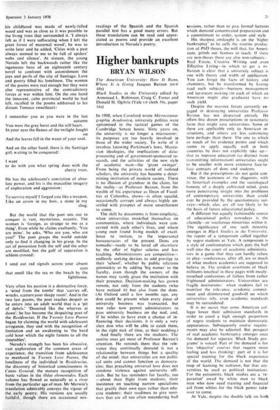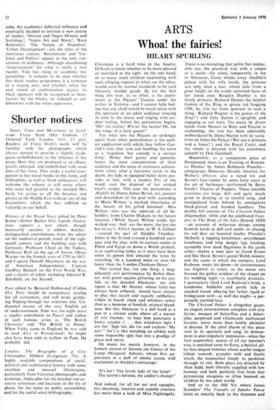Higher bankrupts
BRYAN WILSON
The American University: How It Runs, Where It is Going Jacques Barzun (our 48s)
Black Studies in the University edited by Armstead L. Robinson, Craig C. Foster and Donald H. Ogilvie (Yale UP cloth 54s, paper 16s) In 1908, when Cornford wrote Microcosino- graphia Acadernica, university politics were epitomised in the tactical games of the Cambridge Senate house. Sixty years on, the university is no longer a microcosm: its purposes are too heavily involved in those of the wider society. To write of it involves knowing Parkinson's laws, Marcu- sian ideologies, the implications of data- processing and of government-sponsored re- search, and the activities of the new style of academic man—the 'grant swinger'. From being the private world of isolated scholars, the university has become a deter- mining institution of modern society. There is no illusion of grandeur in the claim, for the reality—as Professor Barzun, from the wealth of his experience as Dean of Facul- ties at Columbia, shows—is often squalid, occasionally corrupt and always highly un- settled with prospect of more unsettlement to come.
The shift he documents is from simplicity, when universities modelled themselves on communities, where individuals were con- cerned with each other's lives, and where young men found living models of excel- lence to imitate, to the impersonal bureaucracies of the present. Dons are nomadic—ready to be lured off elsewhere by the offer of higher salaries and less teaching. Administrators are competitive— endlessly seeking devices to add prestige to their 'school', whether by public relations gimmickry or by adding 'big names' to the faculty, even though the owners of the names may rarely grace the institution with their presence. Decision-making has grown remote, not only from the students (who have noticed it) but also from the dons. (At Oxford until a few months ago, any don could be present when every piece of university business was transacted, but new rules now permit administrators to pass university business on the nod, and, if he wishes to have even a chance of in- fluencing their decisions, it is only a very alert don who will be able to catch them, in the right nick of time, at their nodding.)
And finally there are the students. The restive ones get most of Professor Barzun's attention. He reminds them that the rele- vance they continually demand is not a relationship between things but a quality of the mind; that universities are not politi- cal units and cannot function as democra- cies; that preaching universal love does not condone violence against university offi- cials. But he has reminders for faculty, too —about their flight from students: their insistence on teaching narrow specialisms that gratify their own egos rather than edu- cate students; their readiness to give semi- nars •hat are all too often meandering bull sessions, rather than to give formal lectures which demand concentrated preparation and a commitment to order, system and style.
His sharpest onslaught is on the 'higher bankruptcy' as he calls the routine produc- tion of PhD theses, the mill that, for Ameri- cans, grinds out licenses to teach. If there are non-theses there are also non-subiects- Real Estate, Creative Writing and .even Effective Living—in which to get a as Barzun is clear that a university subject is one with theory and width of application. You can forget the facts of history and chemistry, but be transformed by having read such subjects—business management and ice-cream making lin each of which an American might also graduate) have no such yield.
Despite the massive forces currently en- gaged in destroying universities Professor Barzun has not despaired entirely He offers five dozen prescriptions in systematic form that might save universities. Some of these are applicable only to American in- stitutions, and others are less convincing here perhaps than there. The one to which so much of his evidence points and which
seems to apply equally well in both countries he does not explicitly take up—
that to improve education (as distinct from transmitting information) universities ought to be smaller with more extensive face-to- face contacts of dons and students.
But if the prescriptions do not quite con- vince, the acuteness of the diagnosis, with its historical examples and the sociological honesty of a deeply cultivated mind, gives more penetrating insight into the problems of contemporary universities than could ever be provided by the questionnaire sur- veys—which, alas, are all too likely to be the basis of future educational policy.
A different but equally fashionable source of educational policy nowadays is the clientele—or vociferous minorities within it.
The significance of one such minority emerges in Black Studies in the University, the report of a symposium called together by negro students at Yale. A symposium is a style of confrontation which puts the ball well into the court of academic administra- tors in a game that they can hardly refuse to play—conferences. after all, are so much of what modern academics are supposed to believe in. The strident assertions of black militants interleaf in these pages with mealy- mouthed confessions of failure from rather frightened administrators. Universities are fragile institutions: when students fail to manifest the tolerance, academic commit- ment and disinterested goodwill on which universities rely, even academic standards may be surrendered.
It is no secret that some American col- leges lower their admission standards in order to enrol a high enough proportion of negro students to maintain democratic appearances. Subsequently course require- ments may also be adjusted. But prospect of real academic bankruptcy emerges once the demand for separate 'Black Study pro- grams' is voiced. Part of the demand is for less 'objective' courses that require more feeling and less thinking: part of it is for special training for the black experience of the world. The demand is not that the map of learning be redrawn, but that uni- versities be used as political institutions.
For the extremists, black studies are a 're- paration' owed by white men to black men who now need training and financial aid from whites for the black power take- over to come.
At Yale, despite the double talk on both
sides, the academics deflected militancy and eventually decided to institute a new course of studies. 'African and Negro History and Sociology'; 'Negro Art and Music'; 'Race Relations'; 'The Nature of Prejudice'; 'Urban Development'—are the titles of the innocuous courses. 'Revolutions' and 'Vio- lence and Politics' appear as the only con- cessions to militancy. Although abandoning 'integrationism' for what is really a new racism, Yale has clung to academic res- pectability: it remains to be seen whether this black studies programme is a terminus or a staging post, and whether, when the next round of confrontation occurs. its black sponsors will be recognised as bene- factors by the blacks, or indicted as col- laborators with the white oppressors.















































 Previous page
Previous page